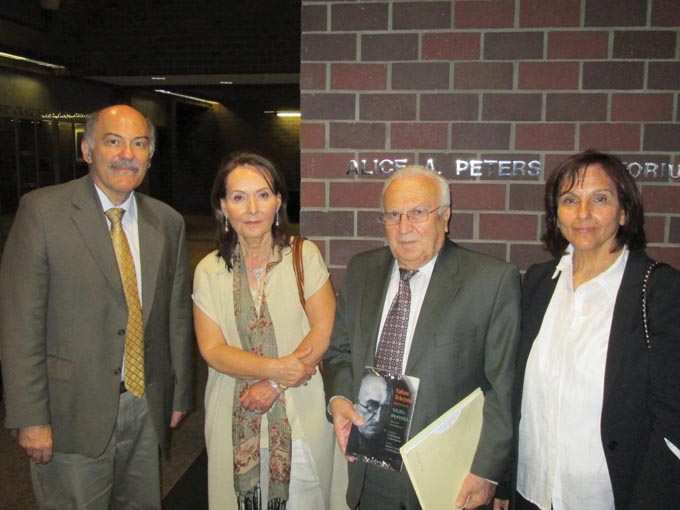Aramayis Orkusyan
Staff Writer

A haunting chill overtook the audience as the bitter words, written by Vahan Tekeyan three years after the purging of the Armenian people by the Ottoman Turkish Empire, echoed across the auditorium.
“Send us to hell. Send us to hell again. You made us know it alas, all too well.”
Tekeyan’s words came to life as they were read aloud, stirring sentiments of a hundred years of suffering. Vahan Tekeyan was a late 19th to mid-20th century Armenian poet and social activist. Regarded as one of the greatest Western Armenian poets, Tekeyan was one of few major poets to survive the Genocide. Consequently, the trials and tribulations of the Armenian people are deeply interwoven in many of Tekeyan’s works. However, many of Tekeyan’s poems also present a hopeful vision of Armenia and the Armenian people—a vision of peace.
Neglected for many years in the English-speaking world, Vahan Tekeyan’s poems took center stage on the evening of September 19 as part of the Fall Lecture Series of the Fresno State Armenian Studies Program. The focus of the lecture was to introduce the newly published Vahan Tekeyan: Selected Poems and to present a second book Vahan Tekeyan – Hadendir.
The lecture brought author and literary critic Edmond Azadian, Dr. Arpi Sarafian of California State University, Los Angeles, and Dr. Tamara Hovhannisyan of the Monterey Institute of International Studies to Fresno State. The distinguished speakers discussed the significance of translating the work of Armenian authors, the significance of Tekeyan’s work, and most importantly the significance of the newly published volume.
Although translating poetry exactly is an impossible task, Dr. Sarafian noted that “the effort to translate must be made whenever it is possible.” Drawing parallels to the classics, Dr. Sarafian highlighted Tekeyan’s “questioning of the benevolent and the divine being, his indignation of man’s inhumanity to man,” as well as other universal concerns, that also offer invaluable knowledge of human nature and the human experience. For this reason, Dr. Sarafian emphasized that “it would be wrong to keep the beauty and the power of these concerns locked in the Armenian language.”
Dr. Tamara Hovhannisyan gave an in-depth analysis of the poetics of Vahan Tekeyan and discussed the emotional aspects of his work. Her remarks in Armenian, focused on the Armenian language Hadendir, written by Edmond Azadian, which has shed new light on Tekeyan’s life and work.
Yet there is perhaps an even greater significance in the release of Vahan Tekeyan: Selected Poems. Published as part of the Armenian Series of The Press at California State University, Fresno under the editorship of Professor Barlow Der Mugrdechian, Vahan Tekeyan is now the 5th volume in the Armenian Series. Moreover, unlike the Hadendir, which is written in Armenian and is aimed towards intellectuals and scholars in Armenia, Edmond Azadian pointed out that “the bilingual volume (Vahan Tekeyan: Selected Poems) is directed towards non-Armenians and to the Armenian young generation who are eager to learn and internalize their legacy in the culture of Armenian literature.”
Indeed with each new addition in the Armenian Series of The Press, more awareness of the Armenian culture is brought to the non-Armenian communities at Fresno State and the greater community, and a new medium is created by which the Armenian heritage can be preserved and passed on to the new generations of Armenians.
 Hye Sharzhoom Armenian Action
Hye Sharzhoom Armenian Action